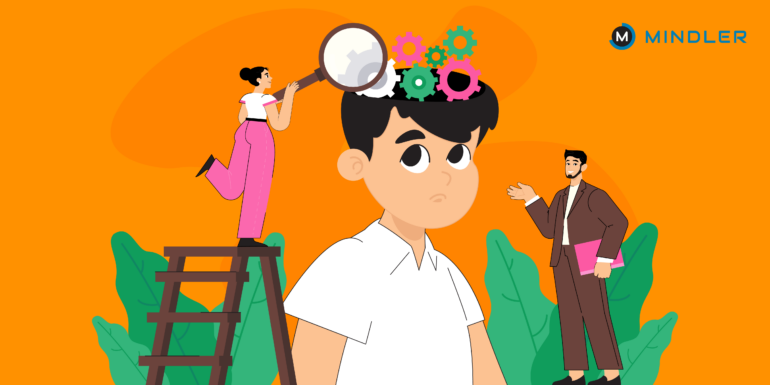In India, many young people are impacted by mental health problems experienced by children. A recent study published in the Indian Journal of Community Medicine in 2024 showed that 10% of children aged 5 to 15 years experience mental health disorders, translating to about 50 million children under the age of 18 years who might need the assistance of a specialist. As more parents, schools, and healthcare providers become more aware, trained child psychologists have been in constant rising demand. In 2023, the market size of the child psychological counseling service was estimated to be around USD 3.2 billion globally and is expected to reach USD 6.5 billion by 2032, at a compound annual growth rate of 8.4%.
Child psychologists have a vital role in aiding children with developmental delays, behavioral disorders, learning problems, anxiety, depression, and issues associated with trauma. It is a highly rewarding career option for individuals who are interested in facilitating positive emotional and psychological outcomes in children and want to make a long-term contribution to their well-being.
What Does a Child Psychologist Do?
Child psychologists are trained professionals who work with children from infancy through adolescence (birth to 18 years). Their role includes in-depth assessment, accurate diagnosis, and evidence-based treatment of a wide range of psychological and developmental conditions.
Their primary responsibilities include:
- Assessing children for emotional, behavioural, and psychological concerns.
- Preparing reports and maintaining records of assessments and interventions.
- Guiding parents or guardians on how to manage specific behaviours at home.
- Collaborating with other child-focused professionals to ensure consistent support.
- Conducting sessions to help children navigate issues such as anxiety, bullying, learning challenges, or family transitions.
- Educating adolescents about the impact of risky behaviour and how to manage peer or academic pressures.
- Contributing professional input in custody evaluations when required, assessing parental suitability.
Common Issues They Address:
- Learning difficulties and academic struggles
- Behavioral problems like aggression or withdrawal
- Anxiety and depression in children
- Social skills development
- Family conflicts and divorce-related stress
- Bullying and peer relationship issues
- Developmental delays and disabilities
- Sleep and eating disorders
Treatment Methods Used:
- Play therapy (especially for younger children)
- Cognitive Behavioral Therapy (CBT)
- Family therapy and parent counseling
- Art and music therapy
- Behavioral intervention programs
- Psychological testing and assessment tools
Educational Path to Become a Child Psychologist
To pursue a career as a child psychologist, you typically begin with foundational studies in school and build towards specialised training through higher education. The following are the steps typically involved in this process:
Step 1: Complete Your 12th Grade
You can choose any stream – Science, Commerce, or Arts. Most undergraduate psychology programs accept students from any stream.
Step 2: Get a Bachelor’s Degree
You need a degree in psychology or a related field such as child development, human development and family studies, education, social work, sociology, cognitive science, or neuroscience. These areas provide a strong foundation for understanding children’s behaviour and mental health.
Popular Undergraduate Courses:
- BA Psychology
- BSc Psychology
- BA Applied Psychology
- BSc Applied Psychology
BA programmes generally explore the theoretical and social aspects of psychology, while BSc courses place greater emphasis on scientific methods, statistics, and biological processes. These courses usually take 3 years to complete.
Step 3: Master’s Degree
After your bachelor’s, you must pursue a master’s degree with a specialization in child psychology:
Master’s Options:
- MA Psychology (with specialization in Child Psychology)
- MSc Child Psychology
- MA Applied Psychology
- MSc Clinical Psychology
The scope after an MA in Psychology in India is broad, especially with a specialization in child psychology, offering opportunities in hospitals, schools, private clinics, NGOs, and research organisations that require skilled professionals to support children’s mental health and development.
Step 4: Specialization and Training
Following your master’s, you can:
- Take diploma courses in child psychology
- Complete internships at child guidance centers
- Get supervised training under experienced psychologists
These additional training courses range between half a year to two years, according to the program. Some well-known institutes providing these courses are the National Institute of Mental Health and Neurosciences (NIMHANS), the Tata Institute of Social Sciences (TISS), and other recognised centres in India.
Step 5: Professional Certification
Be registered with the Rehabilitation Council of India (RCI) to work as a licensed psychologist, a requirement in clinical and rehabilitation psychology positions. Nevertheless, certain counseling jobs involving children, such as school counseling, might not necessitate RCI registration, though they do entail specialised training and licenses.
Types of Psychology Courses Available
Psychology courses in India are offered at multiple levels, catering to varied career paths:
| Level | Types of Psychology Courses | Career Outcomes |
| Undergraduate | General Psychology | Entry-level counseling, HR, research assistant |
| Applied Psychology | Roles in education, community organisations | |
| Counseling Psychology | Support roles in counseling, social work | |
| Educational Psychology | Assistant roles in schools, educational support | |
| Postgraduate | Clinical Psychology | Clinical psychologist in hospitals, private practice |
| Counseling Psychology | School counselor, rehabilitation, private counseling | |
| Applied Psychology | HR, organisational development, community services | |
| Educational Psychology | Educational consultant, school psychologist | |
| Developmental Psychology | Researcher, NGO roles in child welfare | |
| Specialized | Play Therapy | Child therapist specialising in emotional support |
| Art Therapy for Children | Therapist using creative arts in treatment | |
| Behavioral Analysis | Behaviour analyst in clinical and educational settings | |
| Child Development | Child development specialist in research and applied settings |
Career Opportunities
Psychology opportunities in India are expanding due to increasing mental health awareness. As a child psychologist, you can work in:
Healthcare Settings:
- Hospitals
- Mental health clinics
- Child guidance centers
- Rehabilitation centers
Educational Institutions:
- Schools
- Special education centers
- Learning disability centers
- Educational consultancies
Private Practice:
- Open your own clinic
- Offer online consultations
- Conduct workshops for parents
Research and Academia:
- Universities
- Research institutes
- Government organizations
- NGOs working with children
Skills You Need as a Child Psychologist
To succeed in this field, develop these abilities:
- Good communication with children and parents
- Patience and understanding
- Problem-solving skills
- Observation skills
- Empathy and compassion
Why Choose Psychology as a Career Option in India?
Psychology as a career option in India is becoming more popular because:
- Growing awareness about mental health
- Increasing number of children needing support
- Parents are more open to seeking help
- Schools are hiring counselors
- Good earning potential
- Personal satisfaction from helping others
There are still misconceptions about careers in psychology, including beliefs that psychologists don’t earn well or that job opportunities are limited. However, current trends suggest improving demand and diverse job prospects.
Salary Expectations For Child Psychologists
Starting salaries for child psychologists in India range from ₹1.4 Lakhs to ₹4.8 Lakhs per year. The pay can increase significantly with experience, advanced degrees, and private practice.
Top Colleges for Psychology Studies in India
Psychology studies in India are offered by many well-known institutions:
| Category | Institutions |
|---|---|
| Central Universities | – Jawaharlal Nehru University, Delhi; – University of Delhi
– Jamia Millia Islamia, Delhi |
|
State Universities |
– Mumbai University – Pune University
– Bangalore University |
| Private Institutions | – Christ University, Bangalore – Amity University
– Manipal Academy of Higher Education |
Some colleges require entrance exams for psychology courses in India:
- CUET (for central universities)
- State-level entrance tests
- College-specific entrance exams
For students considering whether to pursue psychology education in India or abroad, it’s important to weigh the pros and cons of both options based on your career goals and financial situation.
Tips for Success in a Career as a Child Psychologist
Start Early: Start preparing for entrance exams in 12th grade.
Gain Experience: Work with children as an NGO or as a community program volunteer.
Build Networks: Establish contacts with practicing psychologists.
Stay Updated: Continue educating yourself on emerging studies and methods in psychology.
Practice Skills: Develop your listening and communication skills.
Explore Certifications: You can also attend webinars and seek online certification in child psychology, play therapy, or behavioural analysis to boost your profile.
Conclusion
Becoming a child psychologist requires formal education, on-the-job training, as well as a good grasp of child development. With the right psychology career in India, you can build a fulfilling profession while helping children overcome challenges and support their cognitive and emotional development.








